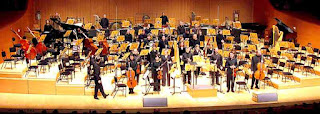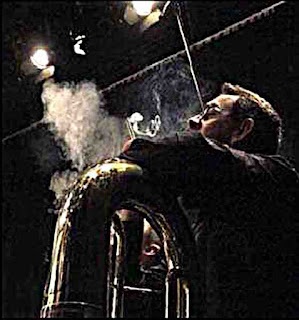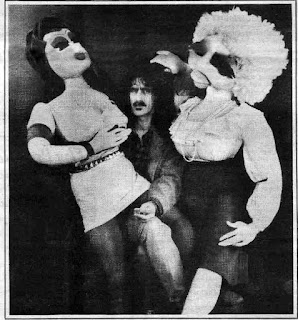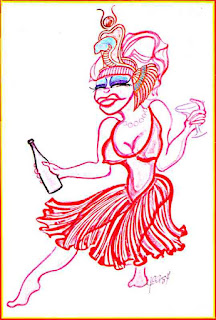I can hear you ask "Who is Stephanie Zimmerman? Why is she relevant to the subject of Frank Zappa's orchestra pieces?"
All you need to know now is that I'm using her name to create some artificial dramatic tension. You'll have to read on to find out "what's the deal".
ANYWAY....
As my three readers must know by now, I worked for Frank Zappa during his "late middle period" beginning just after the break with Warner Brothers and ending a year or so after he acquired the Synclavier. That's roughly 1977 to 1984.
Mostly I worked on his music for conventional acoustic ensembles - meaning pieces for symphony orchestra. I'm grateful for the opportunities he provided me. I learned many things; much of it still useful in my current life.
When Frank passed away in 1993 I realized that I would get one final opportunity from Frank. I would have a chance to watch Frank Zappa find his posthumous place in the history of music.
Clearly his music will not be forgotten; there's too much of it. Equally clearly, as a maverick musician balanced between wildly different genres, he will not be regarded as a seminal influence. Zappa will not be another Beethoven, Wagner, Stravinsky or Schoenberg. Even so, his fans, together with the academic establishment, together with professional musicians, together with his heirs will create a "Zappa legacy" of some sort or other.
Using a roughly normal lifespan for myself I calculated that I had between 30 and 40 years to observe this process. I'm now near the midpoint. Things can still go either way.
My principal interest involves the pieces I worked on. If those pieces are accepted into the repertoire of orchestras and embraced by their audiences then Frank's legacy will not rest merely on his (not inconsiderable) activities as bandleader, guitarist, songwriter and (anti)social commentator. Instead he could be remembered the same way I saw him during his lifetime. That's the way he ought to be remembered: as a composer.
No matter what happens serious-composer-wise, all his albums and concerts and the stories about what he did and said will leave quite a legacy. But things won't be the same if he doesn't get that "serious composer" label. The difference is between entering the 250-year history of all Western Music or being a big fish in the 60-year pond of rock and roll.
Which would you prefer if you had the choice?

Three concerts of Frank Zappa's orchestra music have occupied my attention lately:
- Dupree in L.A
- Bogus in Budapest and
- Seeking Stephanie Zimmerman.
1) THE LOS ANGELES PHILHARMONIC PERFORMS DUPREE'S PARADISE
On May 15, 1970, the Los Angeles Philharmonic performed a concert entitled Contempo 70 at UCLA's Pauley Pavilion. On that concert, along with Frank and the Mothers, the orchestra performed music from 200 Motels
Apparently no one went home from Contempo 70 happy - apart from the audience. Since my arrival in Los Angeles in 1974 I've heard stories of that night from many different people - including composer Mel Powell (who stopped the performance of his piece half way through). Recently my wife Leslie told me, for the first time, that she had attended that concert.
This January 5th and 6th the Philharmonic played Dupree's Paradise, a piece of Frank's for medium-sized instrumental ensemble. It represents the first Zappa performed by the Los Angeles Philharmonic since the 1970 Pauley concert.
I'm aware of a few go-nowhere discussions between Frank and the Phil about possible performances in the intervening 37 years. The fact that our local orchestra finally played a bit of Zappa, even one of his easier ones, after all this time seems remarkable and positive.
Maybe things have settled down enough that the Zappa orchestra pieces can be regarded for what they are rather than for what the composer says or does surrounding the performance. I spoke to one Philharmonic member who performed in both concerts: 200 Motels in 1970 and Dupree's Paradise this month. She didn't talk about the music but she did remember several offensive things which Frank said or did at Pauley Pavilion.
For this program in 2008 Dupree's Paradise was squeezed between larger orchestra pieces. It got normal rehearsal time - almost none - but everyone was well prepared and the LA Philharmonic proved its brilliance once again.
The conductor David Robertson urged the players to achieve a proper Zappaesque feel by using some interesting images. In one spot, to enhance a string color change, he suggested that they think of "someone fiddling with the tone controls of an old radio." In another he said the music should sound like "Webern on a variable speed tape deck."
But there wasn't time for any experimentation during rehearsal (there never is) - and the music was unfamiliar all around. During Frank's lifetime he repeatedly said the only requirement for his music was that the performers play exactly what he wrote on the paper; Zappa didn't want his music "interpreted" by performers. Since that's what performers are trained to do, his comments weren't always received in the best humor.
Of course he hardly ever heard note perfect performances. My own experiences playing his music indicated that once I could play exactly what he had written (or at least get damn close) he responded well to interpretation.
Several times I remember him complimenting a performance by saying "That really talks." You know how actors and dancers (and just about everyone else) say that a good performance "sings". It's hyperbole because usually no actual singing is involved.
A high compliment from Frank Zappa was when he said that you had made the music "talk".
I think Frank would have had to admit that the LA Philharmonic performance of Dupree's Paradise accurately represented what he wrote on the page.
But it did not "talk".

There are moments of romance in Dupree's Paradise that needed some loving. There are moments of humor that needed comic pacing. And there times where I think the music needs a big, old-fashion luftpause. A short wait, a fraction of a second out of tempo that will let everyone in the audience catch their breath and give them time to notice that something new is about to begin. That's what performers do in music of Beethoven, Wagner, Stravinsky and Schoenberg. They should do it in music of Frank Zappa too.
On this Philharmonic program of larger pieces Dupree receded into the background. It was probably not the best choice to end the first half. Better to have begun either half with it. But that by itself wouldn't have brought Dupree's Paradise to life. The audience, like the orchestra, received Dupree's Paradise politely - and everyone went on to the next victim.
The concert was recorded for iTunes. If you weren't at the concert you'll be able to listen yourself and disagree with me for some good reason.
One side note: the final piece was Edgard Varese's Ameriques - a piece for humungus orchestra. It barely fit onto the Wells Fargo Stage (yep that's the "stage name" of the stage inside the Ron Burkle Ralph's Food-For-Less Foundation Auditorium inside Walt Disney Concert Hall.)
The Ameriques orchestra is still quite a bit smaller than the orchestra for Frank Zappa's massive shoe-symphony Sinister Footwear. I wonder how they could squeeze enough players onto the Wells Fargo Stage to ever perform Sinister Footwear. I'd like to see them try.

2) BOGUS POMP ON THE RADIO IN BUDAPEST: 100% ZAPPA
Thanks to the really fine Zappa blog called Kill Ugly Radio I became aware of an all Frank Zappa orchestra concert by conductor Adam Fischer leading the Hungarian Radio Orchestra (the MR Symphony Orchestra) in Budapest Hungary on October 13, 2007. It was entitled 100% Zappa. It was one of three concerts devoted to Franks music in the BOF (Budapest Autumn Festival). I couldn't attend due to other commitments. And money. I would have loved to hear the rehearsals and concert.
The program was four pieces: Envelopes, Pedro's Dowry, Bogus Pomp and Strictly Genteel. These were the orchestra versions premiered at the 1984 Barbican concert in London with the London Symphony Orchestra conducted by Kent Nagano. I copied music for all of them and I worked as orchestrator on the last two (the music of those two comes from 200 Motels.)
Weeks after the 100% Zappa concert, again thanks to Kill Ugly Radio and the Hungarian Zappa blog., I learned that I could hear the concert online in Real Audio via the Hungarian Radio's website. The Real Audio files are still available if you're interested. (They're posted in hour by hour format but the concert broadcast started at 19:35 so you'll need the files for 19 o'clock and 20 o'clock from this page. Good luck.)
I was really enthusiastic about these recordings. The orchestra played very well and it was obvious to me that the conductor was contributing positive interpretation. I was asked by Balint Marosi of the Hungarian Zappa website to write a little bit of commentary. Naturally I wrote a big lot instead of a little bit. The article is entitled In My Perfect World. You can read everything I wrote here.

Here's a quote from me:
"Pedro's Dowry is the most difficult of the four - both to play and to understand. I was very impressed with the way Adam Fischer brought out the connections between themes and enhanced the lyrical qualities. These things often get lost when the notes are so hard."I conclude In My Perfect World with a flight of fancy about Bogus Pomp. It occurred to me that concert audiences, otherwise unfamiliar with Zappa's music, could be introduced to this piece as a symphony in one movement.
Bogus Pomp is very much like a symphony; it has pretty clear sections and lots of thematic references. I suggest four possible orchestra programs that I would enjoy hearing. Each program ends with Bogus Pomp. None of the additional music is too heavy and none of it is generally associated with Zappa - there's not a Varese piece anywhere.
I found two other comments about this Budapest concert. One Hungarian website has this review of 100% Zappa (it's in Hungarian). Here's a paragraph in translation:
"Adam Fischer conducted with his habitual energy and enthusiasm. The humor and playfulness of the four pieces gave Fischer an opportunity to sometimes almost become az instrumentalist member of the orchestra."Tom Trapp, who arranged Frank's music for a different concert in Budapest (the one with my buddy Ed Mann and another Zappa alumnus who I wish was my buddy Mike Keneally), mentioned Adam Fischer in this interview:
"I had a little conversation with Adam Fischer in the dressing room, and he was pleased too, and he seemed to be very into the music, which - for me - is the most important thing when you're dealing with Zappa. You have to almost "live" for that music in that moment, and I think he did that."So what's the common thread so far? It's that I think Zappa's orchestra music needs some strong musical leadership to bring it successfully into the concert hall.
These pieces simply do not play themselves.
3) SEEKING STEPHANIE ZIMMERMAN (or WHY ARE THERE NO PICTURES OF PUPPETS IN PERFORMANCE)
A man named Eric Peterson wrote to me. Eric is a digital artist, computer geek (that's a compliment, of course) and a fan of Frank Zappa. You can find his online stuff here and here and here.
Back in 1984 Eric attended a unique concert of Frank Zappa's orchestra music on the campus of U.C. Berkeley called A Zappa Affair.
The Berkeley Symphony, conducted by the young, unknown Kent Nagano, performed the really really hard Zappa orchestra pieces including Sinister Footwear.
While they played from the pit dancers manipulated life-size (and larger than life-size) puppets acting out the scenarios Frank had overlaid onto his music.

Here's a scan of the program insert. The concerts were broadcast live over KPFA - meaning that there are plenty of bootleg copies floating around. Here's a rave review by Larry Kelp from the Oakland Tribune which gives a good description of what happend. Kelp says:
Zappa's concept, the orchestra, dancers and a dazzling array of sets and props, all coalesced into a huge, two-hour production that was funny, entertaining, mixed the various art forms masterfully, and took a bold step into the future.

Besides Zappa and Nagano, the creative team behind A Zappa Affair included choreographers Tandy Beal and Joan Lazarus. But it was the puppet creations of the late John C. Gilkerson which really made magic happen.
One of the pieces on the program was Mo 'n Herb's Vacation and I was asked to perform the first clarinet part. That was the part Frank had written specifically for me at my request. There wasn't much else for me to do so I got to watch a lot of the goings on surrounding the whole "affair".
It's not hard to guess that during production Frank caused grief by the things he said and did as he guided the whole megillah over the top. Tensions racheted and tempers flared.
Here's a 1987 article by pianist Sarah Cahill reminiscing on the experience from the orchestra's vantage point.
She wrote:
People who went to the Zappa concerts remember them as one of the symphony's best productions ever. Unfortunately, people who worked on the concerts still think of them as a painful episode.I personally remember how adamant Frank was that the performance not be videotaped. But on the night of the concert a professional video camera appeared in the concert hall. Frank was furious and demanded that the tape be destroyed. Long ago I mentioned this fact online here.
Apparently Eric Peterson saw my comment about the video and wrote to say that he had started a personal search for pictures from those performances. All he could find was publicity shots taken before hand. Eric could find no pictures at all of the puppets in performance - video or still. He asked if I could be of any help.
I dug through my vast mess of old flyers and programs and reviews. I found a copy of the program book from those concerts.
Looking through this material I was reminded of the name of the producer of A Zappa Affair - the person Frank angrily ordered to destroy the video tape. He did this at an after-concert dinner in a Chinese restaurant somewhere across the bay in San Francisco. Frank stormed off and the rest of us sat down to eat.
The producer of A Zappa Affair was Stephanie Zimmerman.
Stephanie, if you're out there, Eric Peterson would like to ask you whether some pictures of the performance exist. I hope there are some.
I've scanned the Zappa-relevant pages of the program book and created a pdf. You can download the file here. About 3 megs. It includes a number of publicity pictures, biographies of everyone involved, a slightly different program listing.
There is also an article by Stephanie Zimmerman entitled "How It All Happened". She tells many more interesting details about the creation of puppets and the production itself.
One thing the program book does NOT include anywhere is my name. But I was there. I did perform. Really. I can remember renting a tuxedo.
My own question for Stephanie is "Did you really destroy the tape?". I don't expect her to answer. I sure hope she didn't do it. Trust me, it'll be a great video. I want to see it. You'll want to see it too.

Unfortunately, if the tape does exist, it will be the subject of, um, legal wrangling. I doubt there was any formal agreement among the creators of A Zappa Affair over the rights to reproductions. Probably that's why Frank was so against making it.
The surviving creators and the heirs of the other creators will need to make some kind of agreement before releasing such a document. Believe me, that will not be easy. It will be hard. It will be next to impossible. If you don't already know why that is, you're better off.
But it could happen. I would like to get the process started as soon as possible because I only have a couple more decades to see the thing. Time's a wasting.

Here's a nice chronology of Frank Zappa's life.
I discuss the Wells Fargo Stage in this Mixed Meters post.
Another Mixed Meters post: Varese, Zappa and Slonimsky.
Click here for all Mixed Meters posts tagged "Zappa".
My very special thanks to Barry and all the fine folks at the fine blog Kill Ugly Radio and extra special thanks to Balint Marosi of the equally fine Hungarian Zappa blog. Read about how the heirs treat the fans here.
Also thanks to Eric Peterson (see above) who pointed out that he didn't actually attend A Zappa Affair as I said. But he did listen recently to a recording of the KPFK broadcast. Here's his reaction in his own words:
I found the broadcast I put it on my iPod one afternoon in Feb ‘06, I went for a walk and I was blown away AND very significantly, I was laughing! I was laughing with an audience listening to modern compositions played by an Orchestra. I was so anxious when I got home to find some images of the performance, I mean, how could they not exist? This was a major event. I heard that much that day.Also thanks to David Windt (see comments below) - who took the picture of the puppet on-stage with dancer attached (the dancer, dressed totally in black, is barely visible). This happened not at A Zappa Affair but at a public discussion with Frank (Speaking of Music, May 20, 1984) moderated by Charles Amirkhanian. See David's description of what happened by clicking here.
Bogus Tags: Frank Zappa. . . orchestra music. . . Los Angeles Philharmonic. . . Hungarian Radio Orchestra. . . Berkeley Symphony. . . David Robertson. . . Adam Fischer. . . Kent Nagano. . . EricNP. . . Stephanie Zimmeramn
7 comments :
Clearly his music will not be forgotten; there's too much of it.
Um...that's not very intelligent. Plenty of extremely prodigious composers are fairly well forgotten now.
David:
Very interesting story. As it happens, the life-size puppets were on stage a few nights (I think) in advance of the UCB performance, at the Exploratorium in SF. I was there and managed to take a photo of the one puppet that was on stage. You can read the whole story and see the photos here:
www.rxollc.com/windt/som
Things are bit different, I think, for Frank Zappa than for your "extremely prodigious composers".
For one thing, there's been a new medium of musical distribution for a century or so. It's called audio reproduction. (You may have heard some.)
Frank was a real master at producing audio - better than he was as a notes-on-paper composer. And he produced a lot more audio product (which gets heard a lot) than he did complete ready-to-go notes-on-paper product (which doesn't get heard much at all - except as audio product.)
For another thing, lots of effort goes into distributing Frank's audio product to us consumers because certain people and corporations have a financial stake in keeping legacy sales high. I doubt Zappa albums sell as well as, say, Eagles ones - but there's enough movement to keep his name out there and create new customers. Your "e.p.c."s are jealous of that, I betcha.
And there's all the recordings in the vault. Probably won't be any big posthumous Zappa hits, like I think Tupac is so good at. But a steady stream of interesting albums will help.
Oh, and there's all the fascinating true stories about Frank, plus the un-true stories, the biographies, the articles, his quotes, his pictures, his movies, his videos, and the fan sites and the tribute bands all keeping his memory alive. Someday there'll even be a radio show.
His notes-on-paper orchestra pieces, on which my "not very intelligent" comments were focused could easily be forgotten. That's especially true if the audiences for live orchestra performances don't learn about FZ's music.
If that's all Frank's memory had to rely on he would not be remembered. In fact, if all he had done during his career was write notes on paper music, you and I would probably never had heard of him at all. He wouldn't even have made it to the status of "fairly well forgotten extremely prodigious composer." Just some sort of eccentric.
(Hey, Butter I like your Magritte picture. I have that same image right over my desk.)
David - thank you for that link. May I include the last picture of the dancer with puppet into my picture-starved post? With credit to you of course.
I mean this one.
Thanks very much.
David:
Certainly! I'd be honored if you did! (Feel free to include whatever you like, actually.)
By the way, I just forwarded your post about program ideas that include FZ (http://www.zappa.hu/?q=en/node/2328) to Jeffrey Milarsky at Columbia Univ. He conducts modern music, and I attended a great performance of his last year that included some FZ (http://www.millertheatre.com/Events/EventDetails.aspx?nid=1020). I figured maybe your post might inspire him as he considers future programs. I'll keep my fingers crossed....
Thanks again for the interesting posts. Keep 'em coming!
David
I definitely agree that the orchestral pieces need strong advocates in the classical world for their survival. At the same time, Frank wrote a huge amount of instrumental music that was never scored for orchestra (those that appear on his "rock albums). Many classical fans may find these pieces more attractive than the orchestral works, which I also think are great, for the record. Therefore, I think part of the strategy should be to highlight Frank's versatility at instrumental composition.
"Plenty of extremely prodigious composers are fairly well forgotten now."
Yeah, name 12.
Post a Comment